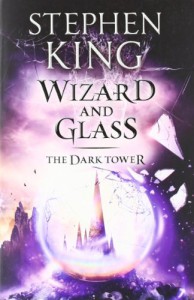Wizard and Glass - Stephen King

Wizard and Glass is the fourth book in Stephen King's Dark Tower septet, and it is the Romance Book.
A story within a story, the book sees Roland telling his ka-tet a tale of the days before the world moved on. Roland is fourteen, and In-World is just beginning to fall to the forces of John Farson, the Good Man, who believes he's fighting for democracy. The young gunslinger is sent for safety to the sleepy Barony of Mejis, a town of horses and fishermen. But Mejis isn't as quiet as it seems - the townsfolk are keeping secrets, and horses are one thing John Farson lacks. Roland and his younger ka-tet - consisting of two gunslingers-in-training, Cuthbert and Alain - have to deal with the implications of this, as well as with the appearance on the scene of one Susan Delgado, unironically the Most Beautiful Girl Ever, and also unironically Roland's One True Love.
King gets away with these clichés just barely, probably because the series is so barmy anyway that it seems churlish to call it out on these things, and also because - I wasn't expecting to say this - Wizard and Glass is a really well-told thing.
See, the first time I read it, I found it tedious and drawn-out, because what I really wanted to read about was the crazy version of Kansas older Roland and his gang find themselves in after they've beaten Blaine the Mono, not some teenagers in a Western. This time around, I knew what was coming, so I wasn't constantly hoping the next chapter would return to Crazy Kansas. And, because I knew what was coming, I found this creeping sense of dread as I read Roland and Susan's story to its conclusion. (I don't think it's much of a spoiler, given the general tone of the series and all the talk of how the World Has Moved On, that the story does not end well.) King actually does a great job of building up this hypnotic romantic dream and then shattering it all as the gunslingers disrupt one plan too many. There's real horror as the world begins to turn nightmarish, the community imploding on itself along faultlines political but also very primal.
By contrast, returning to the frame narration at the end is a bit of a disappointment. The Wizard of Oz thing - the Emerald City, really? - feels kind of ridiculous, and the ka-tet's confrontation with the villainous Randall Flagg, who has, after all, been trailing them for basically the whole series, is really anticlimactic. The book is also at least 100 pages too long: 800 pages is really not necessary for this story, which has been told by countless other authors in many, many fewer words. So I'm not raising the rating for this one, and I still do feel that, however well told it is, the long digression to Mejis is out of place in the series, and would have worked better in flashbacks, or as a brief chapter, not a whole book.
Still. I enjoyed Wizard and Glass, for the most part. That's enough.
 4
4


